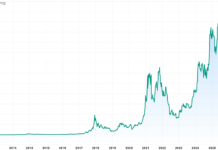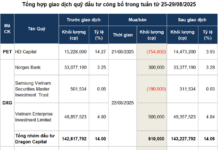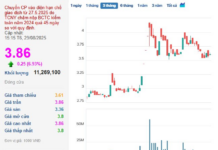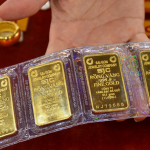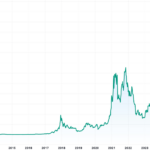Mr. Minh Khang, from Hoang Mai, Hanoi, wanted to purchase two taels of SJC gold bars to pay off his debts. However, for several days, he was unable to place an online order from four state-owned banks or the SJC Company. He even tried visiting well-known gold shops like Bao Tin Minh Chau, Doji, and Phu Quy, but to no avail. Following a colleague’s suggestion, he went to a gold shop on Hang Bac Street in Hoan Kiem, Hanoi, and easily purchased two taels of SJC gold bars at VND 80 million per tael. “I didn’t need any paperwork to prove that this was SJC gold. The shop owner told me that they would buy it back from me at the listed price whenever I wanted to sell it,” said Mr. Khang.
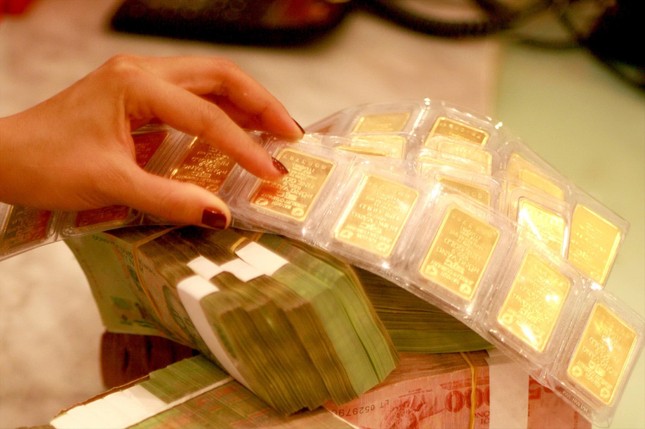
People are facing difficulties in directly purchasing gold from the four banks and the SJC Company. Photo: Nhu Y
The emergence of transactions with SJC gold bar selling prices higher than the prices set by the five units authorized by the State Bank of Vietnam has created opportunities for people to line up to buy gold and then sell it to make a profit. Recently, Hanoi police identified four to five separate groups hiring people to queue and buy “stabilizing” gold at some branches of Vietcombank, Agribank, and BIDV in Hanoi. After obtaining a queue number and purchasing the gold, the queuers would gather to hand over the gold to the person who hired them. Some would then go to other bank branches to queue and buy gold, only to sell it to small gold shops to profit from the price difference. One shop bought 14 taels of SJC gold bars from these queuers, with prices ranging from VND 80 to 82 million per tael, depending on the time of purchase.
Currently, many people still want to buy gold but cannot do so online. While small gold shops lack the license to trade gold bars, they can still cater to customers’ needs at any time, offering prices at their discretion. This “black market” for gold, similar to the US dollar’s presence in the free market over the years, has also encouraged the continuation of queue-for-hire services, now extending to online purchases to profit from price differences.
Minimizing market intervention
Recently, a research team from the National Economics University asserted that although no longer recognized as a form of currency, gold remains crucial in the economy. Vietnam is a country where people have a strong habit and demand for storing, consuming, investing in, and speculating on gold. Therefore, in the past two decades, the government and ministries and sectors have continuously modified gold market management policies to effectively regulate and influence the market, ensuring that gold price fluctuations do not impact exchange rates, the foreign exchange market, and macroeconomic stability.
This research team recommended minimizing direct administrative intervention in the gold market. Accordingly, the State Bank of Vietnam should promptly amend Decree 24 to refrain from directly intervening in the gold market through administrative measures and instead focus on policy management and planning, regulating foreign exchange reserves in gold according to current legal regulations. Specifically, it should consider granting licenses to qualified enterprises to import and produce gold bars to balance supply and demand and meet people’s investment and storage needs, rather than solely holding the authority to produce gold bars.
Authorities need to take measures to eliminate price differentials, especially for SJC gold bars, moving towards liberalizing gold imports and exports. Specifically, the State Bank of Vietnam should consider allowing some enterprises to produce gold bars to supply the market. This aligns with international practices and will help reduce the price gap between domestic and international SJC gold bars.
Additionally, the State Bank of Vietnam should consider permitting enterprises that manufacture gold jewelry to import gold materials.
Gold expert Tran Duy Phuong argued that the current administrative solution could not be sustained indefinitely. He suggested that the State Bank of Vietnam should abandon the SJC gold bar monopoly to enable other reputable and high-quality gold brands to join the gold bar production and increase the market supply.
If the State Bank of Vietnam persists with the current gold sale solution, Mr. Phuong advised that it must grasp the gold demand among the people to prepare an appropriate supply and develop a practical response.
Accordingly, people could register the amount of gold they wish to purchase, without quantity restrictions, and make a deposit. After six to seven days, the gold would be delivered. This approach would help the bank understand the people’s actual gold demand and formulate an appropriate supply plan, thereby curbing speculation.
According to the State Bank of Vietnam, after implementing the solution of selling gold directly to the people through four state-owned banks and the SJC Company, these units have sold hundreds of thousands of taels of gold.
Gold prices: SJC gold and plain gold rings surge simultaneously
On the morning of January 31st, the prices of SJC gold and 24k smooth gold rings in Vietnam saw a simultaneous increase compared to the previous day.

















